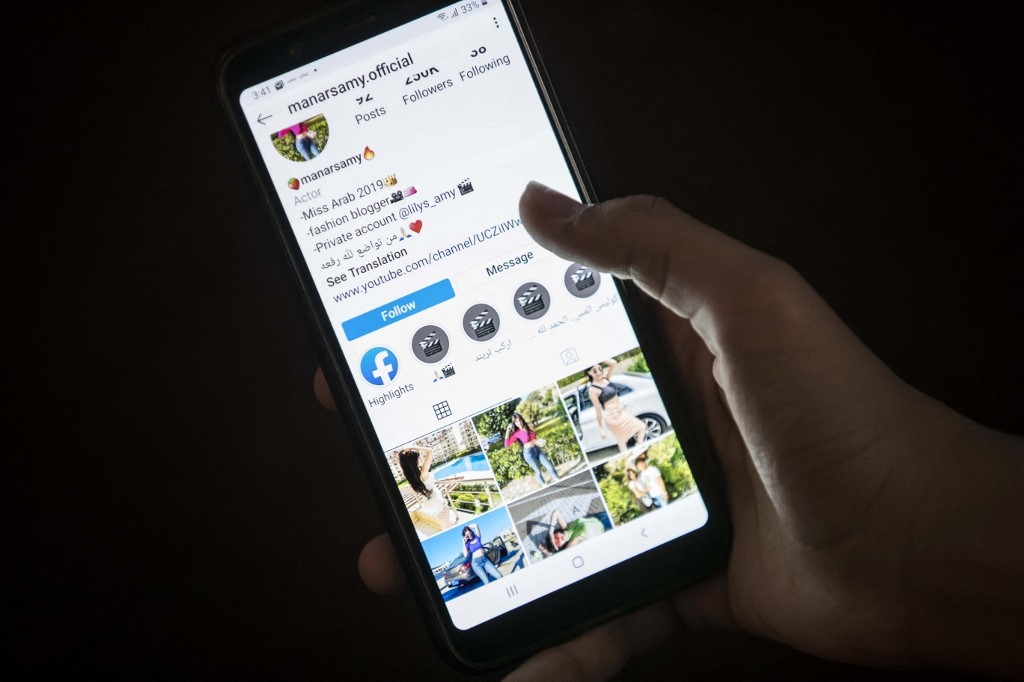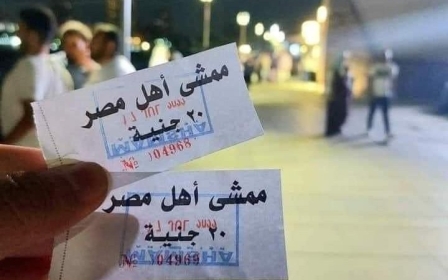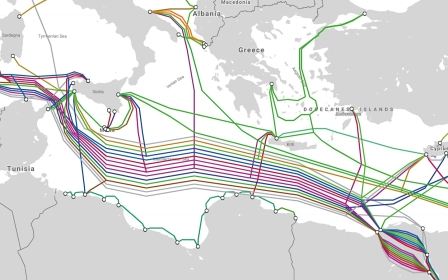Egyptians want unlimited internet. Their government thinks they will steal it

For thirteen years, millions of Egyptians have been deprived of unlimited internet bundles because their government decided they should only pay for what they use.
But now, with most of the population becoming internet users, many are demanding an end to the so-called “fair use policy”, which has been applied since 2009 against a background of alleged internet theft.
'The internet package usually ends a long time before the end of the month'
- Mohamed Mustafa, civil servant
In the mid-2000s, it was common for internet subscribers in Egypt to buy unlimited packages and then give access to neighbours and friends in return for a monthly fee.
This caused losses to internet providers and gave rise to the restrictive policy, whereby internet providers give subscribers limited packages with prices tailored to their capacity and speed, communications expert Amr Badawi explained.
"It was necessary to make users pay for the actual amount of internet they consume," said Badawi, who served as the head of the National Telecom Regulatory Authority, the executive arm of the Ministry of Communications and Information Technology, in 2009, when the fair use policy was enforced.
New MEE newsletter: Jerusalem Dispatch
Sign up to get the latest insights and analysis on Israel-Palestine, alongside Turkey Unpacked and other MEE newsletters
He was one of the government officials enthusiastic about the policy.
"It is not fair to make all subscribers pay the same amount of money for different consumption levels," Badawi told Middle East Eye. "Those who use the internet heavily should pay for that."
Bundles not enough
When the fair use policy was enforced in 2009, the number of internet subscribers was only 12.3 million, or around 15 percent of the population, which was 81 million at the time.
At the beginning of 2022, the number of internet subscribers was 76.4 million, up from 63.6 million a year earlier, which is 75 percent of a population that now stands at 103 million.
Most of the social, political, and economic changes that have happened in Egypt in the past decade were internet-driven, from the 2011 uprising against longstanding ruler Hosni Mubarak to campaigns against sexual harassment and commodity price hikes.
'Unlimited internet will make the service providers lose money and will also put a lot of pressure on available infrastructure'
- Osama Yassin, CEO of a local telecom company
When Covid-19 erupted two years ago, the Egyptian government rediscovered the worldwide web, as it moved a significant part of its activities online, from commercial transactions to education, in its desire to reduce human contact and infections.
Millions of the nation's school pupils and university students attended their classes online, billions of Egyptian pounds in commercial deals were made online and meetings inside all institutions, including by top government officials, were held virtually.
This growing dependence meant more and more data was being consumed by internet users.
However, this rising consumption meant that users often needed to go beyond the limited data packages available, opening the door for accusations by subscribers that the service providers were giving them very little for a lot of money.
"The internet package usually ends a long time before the end of the month," Mohamed Mustafa, a civil servant in his late thirties, told MEE. "I usually buy an additional package, which is very costly for me."
When users consume all the gigabytes contained in their packages, the internet speed slows down automatically to a minimum, rendering the whole service useless.
Most subscribers have to buy additional packages before the traditional package renewal date, which means that they have to pay twice the monthly fees they should be paying to the service providers.
"The problem is that the internet has become central to everything in our lives, from education to work," Mustafa said.

The prices of monthly internet bundles start in Egypt from $6.3 to $53, depending on their download capacity and speed.
These are high prices in a country where university graduates can earn as little as $123 a month - if they can find a job.
Some internet subscribers pay up to 10 percent of their salaries in fees every month.
On the other hand, some internet providers say giving subscribers unlimited quotas would cause them financial losses.
"Unlimited internet will make the service providers lose money," Osama Yassin, the CEO of a local telecom and technology company, told MEE. "It will also put a lot of pressure on available infrastructure."
The internet in Egypt is provided by a large number of suppliers. The most important is Telecom Egypt, the state-owned company that monopolises fixed-line services.
But there are other providers that also share control over Egypt's cellphone market, namely Etisalat, Vodafone, and Orange.
Egypt's location as a fiber optic cable hub, linking Europe, Africa, the Middle East, and Asia, means up to 30 percent of the global population's internet connectivity transits through it.
But the country lagged behind most of North Africa in mobile internet speeds during the first quarter of 2021, according to the internet analysis site, Oakla.
However, it had the fastest median download speed over fixed broadband in North Africa at 26.58Mbps (4.82 Mbps upload), Oakla added.
'We are not fools'
A campaign, launched on social media last month, has attracted widespread support, with those behind it insisting internet companies give them unlimited packages.
"We have started the war and we are going to win," one campaign participant wrote on Twitter.
Some people have participated in the campaign under the slogan, "stop stealing, stop cheating, we are not fools".
'Unlimited internet is much needed, especially for educational purposes'
- Maha Abdel Nasser MP
The "Unlimited Internet in Egypt" hashtag has been trending for weeks amid growing support from subscribers and users.
The participants vow to keep voicing their demands, which they consider a human right.
The campaign has also gained support from celebrities, including comedian Mohamed Henedy who said the internet has become a central part of Egyptians' life.
"Education depends on the internet, the press has all assumed a video form and we have thousands of gamers in one of the world's most important industries," Henedy wrote on Twitter. "Unlimited internet has become necessary."
Pro-government journalist Mustafa Bakri called on Egyptian President Abdel Fattah al-Sisi to intervene by taking what he described as "decisive action."
Meanwhile, a number of MPs have called on the ministry of communications to convince providers to meet subscribers' demands.
"Unlimited internet is much needed, especially for educational purposes," MP Maha Abdel Nasser, a member of the Committee on Communications at the House of Deputies (the lower chamber of parliament), told MEE.
Some internet subscribers have already terminated their subscription to force internet service providers to bow to the demands of the campaign.
Other people have reportedly refused to subscribe to internet services when they were approached by service providers.
In response, the Minister of Communications and Information Technology, Amr Talaat, countered such calls by saying that unlimited internet quotas would be costly for subscribers.
"The same quotas will be unfair for subscribers who do not use the internet a lot," the minister told Egyptian television earlier this month.
Talaat said his ministry is more focused on making the internet available for all Egyptians, including those living in rural areas.
He revealed that his ministry had spent $2.1 billion on internet infrastructure in the past and plans to spend an additional $3.4 billion.
Likewise, Badawi, the former communications official, told MEE that unlimited internet is "not what Egypt needs now".
"Instead, we need to strengthen internet networks inside the schools. This is crucial since education is the most important component of the digital transformation our country aspires to make."
Middle East Eye delivers independent and unrivalled coverage and analysis of the Middle East, North Africa and beyond. To learn more about republishing this content and the associated fees, please fill out this form. More about MEE can be found here.





